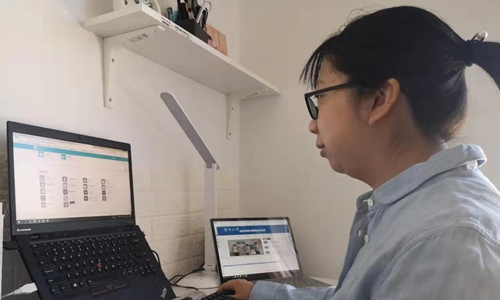
A teacher with Northeastern University works at home in Shenyang, northeast China's Liaoning Province, Feb. 4, 2020. (Xinhua/Pan Yulong)
Conducting data analysis, content review and document editing, Liu Hai's first day back to work on Monday after this year's Spring Festival holiday is almost business as usual, except that he now works from home.
The 29-year-old works for an Internet company in Beijing. Due to efforts to curb the novel coronavirus outbreak, the capital issued a notice on Jan. 31 asking enterprises, except for those involved in key sectors, not to resume their work earlier than midnight on Feb. 9, and employees were encouraged to work from home.
"Although we can only communicate with each other online, the home office has little impact on us, as most of our work can be done through the Internet," he said.
As more Chinese provinces and cities have postponed the resumption of business to curb the spread of the epidemic, working from home has become a new trend for companies across the country to stay operational in the virtual world.
"So far, this is the best way to prevent employees from being infected," Liu said.
Thanks to the rapid development of China's Internet industry, a series of productivity software has been developed in recent years, making it possible for enterprises to adopt online offices in this special period.
Chinese Internet giant Alibaba announced on Jan. 30 that the full set of a home office system, developed by its mobile office tool DingTalk, will be offered free to 10 million enterprises. So far, more than 6 million companies and organizations have used DintTalk's online office products.
"A home office is not as smooth as face-to-face communication, but it is a special measure in this special period. Through DingTalk, we can work anytime and anywhere, which can help minimize the impact of the epidemic," said Lyu Ning, product operations manager of an Internet education company based in Shanghai.
Besides enterprises, China's financial, educational and even judicial sectors have joined the trend of working from home offices to reduce crowds and prevent the spread of the coronavirus outbreak.

A judge with Liaoning High People's Court discusses cases with his colleague via video call at home in Shenyang, northeast China's Liaoning Province, Feb. 4, 2020. (Xinhua/Pan Yulong)
In eastern China's Shandong Province, a court trial took place online Monday with no plaintiff, defendant or agent showing up at the intermediate people's court of the city of Binzhou. Instead, the court heard the case via a group video call to prevent the gathering of people.
Teachers at the senior high school division of Northeast Yucai School in the northeastern Chinese city of Shenyang have organized online classes.
Through audio and video live streaming, students can "raise their hands" to ask questions at any time, while teachers can assign classroom exercises and homework and correct them in real-time, ensuring that online teaching can almost achieve the similar results as on-site teaching.
"It is certain that the epidemic has caused difficulties, but challenges contain new development opportunities as some industries have created new modes of production. Through innovation, China will minimize the harm of the epidemic, promote economic recovery and maintain stable development," said Liang Qidong, vice president of the Liaoning Academy of Social Sciences.
